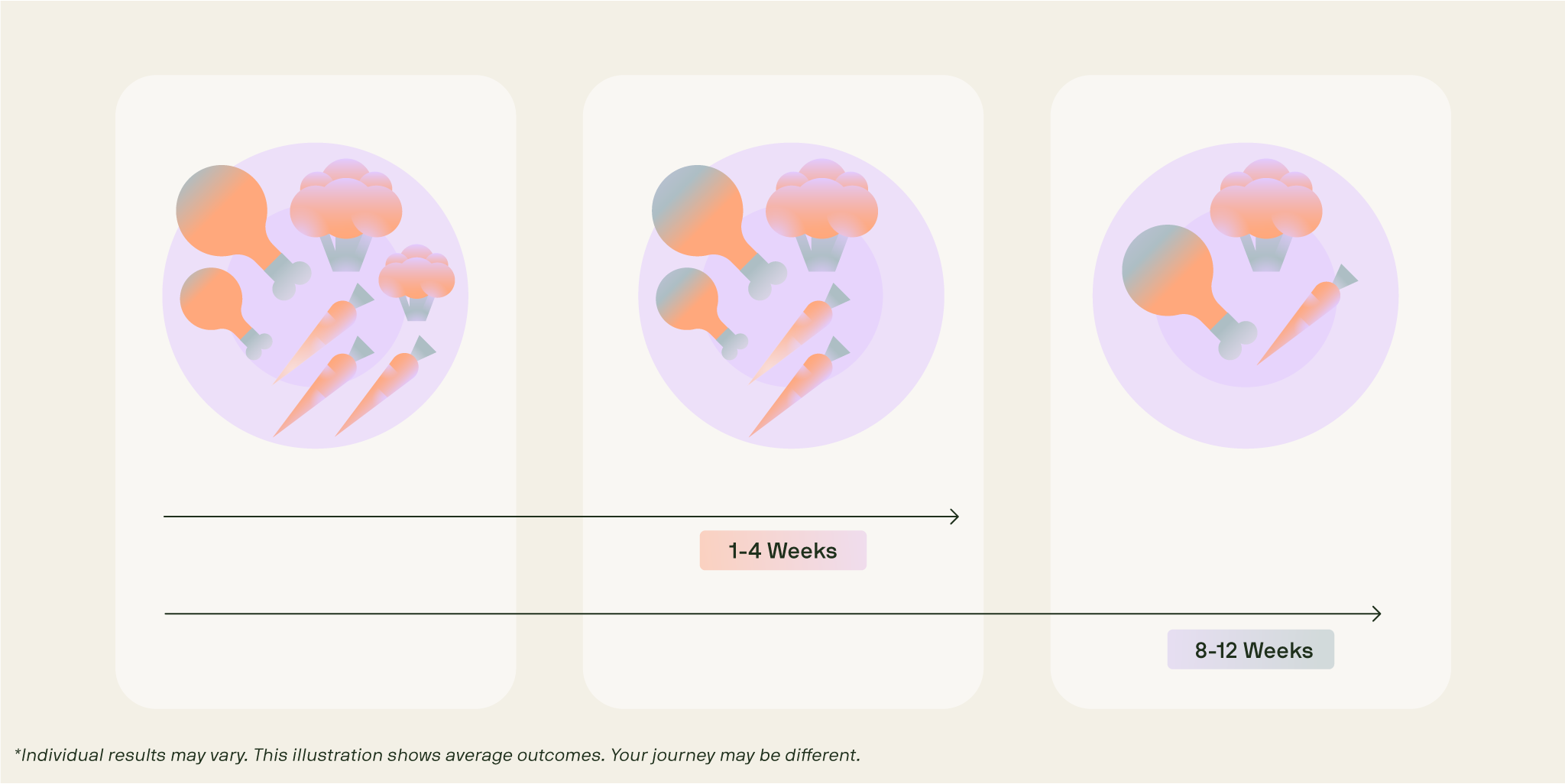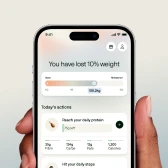Semaglutide is the main (or ‘active’) ingredient in weight loss drugs like Wegovy. It’s also the main ingredient in Ozempic, a drug typically used for treatment of type 2 diabetes.
Semaglutide suppresses your appetite by mimicking a hormone that’s produced in the body, called glucagon-like peptide-1 (GLP-1). GLP-1 is naturally produced when we eat, and signals to the brain that you’re full.
If you’re curious about taking Wegovy, or have just started your course of weekly injections, you might be itching to see results straight away. In this article, we’ll dive into not only how semaglutide works, but how quickly it suppresses your appetite, and how to manage changes in your eating habits.
Remember, weight loss medications aren’t a ‘quick-fix’ to weight loss. They’re best used as part of a weight loss plan that includes regular exercise and a balanced diet.
When does semaglutide start suppressing appetite?
Everyone is different, you may see results much faster or slower than someone else taking the same dose of semaglutide medications like Wegovy. Some people start noticing appetite suppression within the first 1 to 4 weeks, even at the starting dose of 0.25mg.
However, the full appetite-suppressing effect typically develops over 8-12 weeks as you gradually increase your Wegovy dosage. By week 12-16, when most people reach their stable dose (1.7mg or 2.4mg), they usually experience the maximum appetite suppression.

Here’s what your semaglutide journey week-by-week might look like:
How semaglutide works for suppressing appetite
Wegovy mimics the body’s naturally occurring GLP-1 hormone, which sends signals to the brain to control your appetite and hunger. It works on the reward pathways in the brain, reducing cravings and food noise. Moreover, it slows down digestion so you feel fuller for longer after eating, enabling you to eat less overall. In addition to suppressing appetite, semaglutide offers significant benefits, such as improved blood sugar control, reduced risk of cardiovascular disease, and potential improvements in metabolic health. By keeping energy levels steady and fostering sustained weight loss, semaglutide can contribute to better overall health and well-being.
How much weight can you lose on semaglutide?
How much weight you can lose on semaglutide varies from person to person. As individuals can react to medication differently there’s no one-size-fits-all answer, but we do have an idea based on clinical studies.
Evidence indicates that when used alongside a balanced diet, physical activity, and behavioural support, Wegovy users see an average weight loss of almost 15% after 68 weeks.
At higher doses, this could be even greater. Novo Nordisk, the manufacturer of Wegovy, has announced a new, higher dose: 7.2mg. Participants taking Wegovy 7.2mg lost an average of 20.7% of their body weight over 72 weeks. A third of users lost 25% or more. Results suggest that this higher strength rivals medications like Mounjaro (for comparison, Mounjaro can lead to an average weight loss of up to 20.9% at the highest dose of 15mg over 72 weeks). Wegovy 7.2mg isn’t available just yet, but is likely to be launched soon.
Ultimately, it’s not a race. Medications like Wegovy and Mounjaro should be used alongside healthy lifestyle changes to see the best results. Once you’ve got your new routine down after a year or so, you’ll be able to maintain it without the help of semaglutide. It’s a long journey, but you can do it.
Can you speed up semaglutide's appetite suppression?
You might be wondering: can you increase your semaglutide dose to speed up appetite suppression or weight loss? The short answer is no.
While it's tempting to want faster results, it's crucial to understand why the gradual dose escalation schedule exists.
The standard titration schedule (increasing gradually every four weeks) is designed to minimise side effects while allowing your body to adjust to the medication. Increasing doses too quickly can lead to severe side effects that could force you to stop treatment altogether.
Following the gradual titration schedule is much better than trying to speed things up. Your body needs time to develop tolerance to semaglutide's effects.
Semaglutide side effects
If you’re taking semaglutide, it’s important to be prepared for potential side effects, as they impact more than one in 10 people using this medicine, especially as the dosage is increased.
The most common side effects include:
- nausea
- vomiting
- diarrhoea
- constipation
Less common side effects include:
- low blood sugar
- changes in how food and drink tastes
Serious side effects include:
- severe stomach pain that doesn’t go away
- allergic reactions
- pancreatitis
- gallbladder disease
For the most part, semaglutide side effects are minimal and can be managed with over-the-counter medicines, staying hydrated, and eating smaller meals. However, if you have any serious side effects you should talk to your clinician as soon as possible to discuss whether to lower your dose.
Side effects support at Voy
"If you're using Voy and you experience any side effects, rest assured that our expert clinicians are just a message or phone call away. They can adjust your dose, prescribe medication to ease your symptoms, or simply offer reassurance.
Everyone responds differently to weight loss treatment and we'll help you find what feels right for you."

Managing hunger while waiting for semaglutide to work
The first few weeks on semaglutide can be challenging, especially if you don't notice immediate appetite suppression. But don’t worry, here are some evidence-based strategies to help manage hunger while waiting for the medication to reach its full effect.
7 science-backed tips to control your food cravings
1. Prioritise protein at every meal.
Protein is the most satiating macronutrient and can help bridge the gap until semaglutide's appetite suppression kicks in. Aim for 25-30 grams of protein per meal from sources like lean meats, fish, eggs, Greek yoghurt, or legumes.
2. Stay hydrated throughout the day
Sometimes thirst masquerades as hunger. Drinking water before meals can also help you feel fuller. Try having a glass of water 15-20 minutes before eating.
3. Include high-fibre foods in your diet
Vegetables, fruits, whole grains, and legumes slow digestion and help maintain steady blood sugar levels, reducing hunger spikes between meals.
4. Consider meal timing and structure
Some people find that eating smaller, more frequent meals helps them manage hunger better during the initial weeks on semaglutide. Others prefer three structured meals with planned, protein-rich snacks.
5. Practise mindful eating techniques
Eating slowly and without distractions can help you recognise satiety signals more effectively. Put your fork down between bites and chew thoroughly.
6. Use distraction techniques for non-physical hunger
If you're experiencing cravings rather than true hunger, try going for a walk, calling a friend, or an activity you love. Often, cravings pass within 15-20 minutes.
7. Don't underestimate the importance of sleep
Poor sleep increases hunger hormones and cravings. Aim for 7-9 hours of quality sleep per night to support your weight loss journey.

Remember, these strategies aren't just temporary fixes—they're healthy habits that will enhance semaglutide's effectiveness once it reaches therapeutic levels. If your hunger still feels like it’s a problem after several weeks, discuss your concerns with your healthcare provider.
In the meantime, you can find practical ideas for balanced meals, grocery shopping, and simple batch cooking in our GLP-1 shopping and meal prep guide to help you stay on track.
Who can take semaglutide?
You might be prescribed semaglutide medications such as Wegovy if:
- You’re over 18.
- You have health problems due to your weight.
- You have a BMI of 30 or above
You can’t take semaglutide if you’re pregnant or breastfeeding.
Your clinician should take your full medical history to make sure you don’t have any conditions that could make taking semaglutide unsafe. They’ll also want to check if you take any other medications that could negatively interact with the medication.
If you’re curious about trying weight loss medication like semaglutide, find out if you’re eligible by taking our short weight loss quiz.












